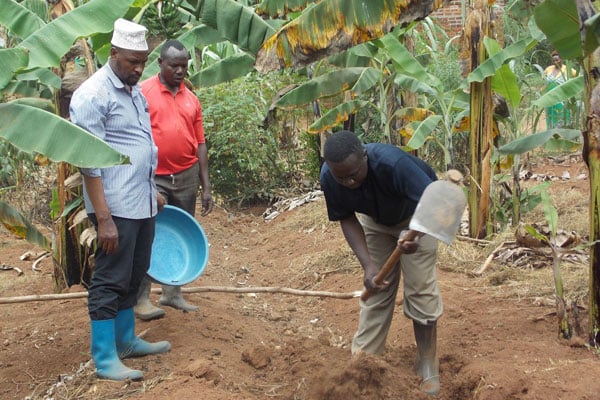Prime
Planning is the heart of successful farming

The farmer inspects a feedlot for his livestock.
What you need to know:
- Many farmers are running unprofitable operations. But with the right knowledge of farm planning, they can change their fortunes.
Even though most people want to get profit out of their farms, discussions around farm management can be sensitive and extremely hard.
Uganda’s agriculture is experiencing climate change effects manifested through frequent, intense and prolonged dry spells, floods, increase in temperature and higher incidence of pests and diseases.
This has resulted into shifts in farming seasons, which has led to loss and damages, and contributed to the low agriculture performance.
These effects are predicted to increase in magnitude and intensity, further constraining agricultural production and people’s livelihoods.
Therefore, sustainable agricultural production will highly depend on a climate resilient approach with effective farm planning.
Samuel Nsubuga, an animal specialist who now focuses on agribusiness solutions at Safa Agro Consults in Magere, Kyadondo, says that “many farmers cannot see a path forward in terms of where they want to go and they do not know how to start.”
Nsubuga, the founder and director of Smart Agribusiness Forum Africa (Safa) agro consults, aims at bringing smart approaches to agriculture.
“We no longer want to do things the way our fathers did. They planted and lived by the mercy of the weather conditions. These days when we are farming, we do not just put things on the land anyhow. We do planning to have everything in place,” Nsubuga says.
Safa agro consults, build agribusiness ideas into modern ideas. They also do farm management, build farm structures while offering consultancy and advisory services.
His clients include individual, private and government parties and has been featured in the media. He introduced the agribusiness week at St Mary’s College Kisubi in 2018 where students return during holidays for one week to study and visit different farms to acquire more practical farming knowledge.
Employing 10 people, Safa has experts in different sectors including water engineers, soil technicians, agronomists and veterinarians.
“You don’t find me everywhere but of course there are farmers who always want me specifically,” he says.
Smart farming
Nsubuga, who does piggery and horticulture at his home in Magere, studied at Busitema University on a government sponsorship scheme and worked in Mukono District as a veterinary officer specialising on zero grazing. But he raised funds to return to university to follow his passion for horticulture at Bukalasa Agricultural College. According to Nsubuga, farming is 80 percent science and 20 percent art.
To address the escalating demand for food from the limited farmlands and labour, agriculture experts such as Nsubuga are introducing innovative solutions in the farming arena. These solutions focus on assisting farmers in filling the supply-demand gap by ensuring high yield, increased profit, and protection of the environment.
Smart farming is aimed at ensuring optimum utilisation of resources to achieve high crop yields and reduced operational costs.
The increased development of communication technologies, such as the expansion of internet services, is also influencing the adoption of digital technologies in agricultural practices.
Nsubuga explains that most farmers in Uganda do not understand smart farming but the changing weather conditions and food demands are creating a shift.
“When we talk about farming, we mean approaching agriculture depending on the conditions around you. When you realise your area is very hot, then you have to think of irrigation options or water conservation measures. Farmers should plan depending on the risks they face,” he says.
He that the progress is good. Last year, his company improved 78 farms.
“We found most of them unprofitable and we put up systems and structures that improved their operations. As Safa, we get up to 18 percent of farmers that take up these technologies,” he says.

Nsubuga explains how he raises seedlings using greenhouse technology. PHOTO/GEORGE KATONGOLE
Nsubuga estimates that up to 80 percent of farm losses are as a result of poor management.
“Even if most farmers assume diseases and farm inputs are the biggest causes of farm losses, poor management ranks higher. You may buy the right pesticides but a farm worker who is not trained or monitored, can do the wrong thing,” he says.
Keys to farm planning
Nsubuga says that having a farm plan in place can help one stay on course when difficulties unfold.
“Most farmers tend to focus on day-to-day business operations of producing commodities but having a farm business plan in place helps you stay true to your vision and the mission,” he says. “It helps you stay on course and not get lost especially when you are stressing factors such as crop failures or machinery breakdown,” he adds.
A farm plan, he says, encompasses the breadth and width of your farm’s business.
“It should have a vision that scares you. Maybe you look at something such as the farm requiring Shs1b to get there yet you do not have even Shs50m. For instance, when you have one acre where you would like to grow spices with a dream of owning an herbal pharmacy in future, you look at the resources at hand such as land, accessibility to the market and resources the farm demands including human resources,” he says.
The plan addresses a broad spectrum of components such as your values and goals, business goals, an operation plan, marketing plan, expansion plan and sustainability plan.
“This gives you an idea of the priorities you have to set for your farm. You may need to add value to your products yet you might not have the money for dryers. You set how to get there. The parts of the farm plan are like spokes in a wheel. All need to work together for long-term success,” he says.
Nsubuga says that it is important to understand the marketing dynamics. He says that some people have the potential to move from one office to another seeking customers while others have networks or social media platforms that can be used.
“The most important thing is to have more regular customers who will keep production going,” he says.
Nsubuga suggests that the writing of a broad-based plan begins with holding business meetings to discuss goals, resources and goals of the business.
In sum, says Nsubuga, farmers must consider the various value chains because what you may consider as waste may be raw material for the next product. This calls for room for expansion.
He says that farm operations should be sustainable to keep in business. Establishing another farm, for instance, that uses manure or raw materials from another should be considered to cover losses from one enterprise.
“Where you sell spices, they may need vegetables too,” he says.
Although farm owners may not intend to expand into commercial farms, they need to make profit from their operations. Nsubuga explains that taking note of all expenses helps in eliminating what he calls casual profits.
“For instance, there are people that feed a pig with Shs300,000 and sell it at Shs250,000. This arises from the fact that some of the money was spent indirectly such as airtime, transport, time and rent costs, if they are using their own land. Casual profits are assumptions that you are working. To make farming a business, everything around it should be viewed in money form,” Nsubuga says.
He adds that realistically, profits in farming are realised after about three years or more which calls for patience.
Although the details are too much for peasant farmers, Nsubuga explains that farming does not come on a silver platter.
“Even in the world, there is that one per cent of people that controls the world. They put in the work. The same thing you are lamenting about, someone else is finding a solution for it. Farmers have to realise the fact that the world has changed and they need to put in the work,” he says.

Nsubuga also grows tomatoes.
Nsubuga admits that farmers are right to grumble about the amount of information they receive in the course of their work from the media. He explains that farmers can critique the information they get.
“But using expert knowledge from experts and agronomists is the key. Farmers need to work hand-in-hand with extension workers to be able to run profitable businesses. Most of the information in the media is geared towards encouraging people into farming. That is why they quote figures on profits. A good farmer does not look at those figures but the farming lifestyle because profits will take time to come,” he says.
Records
Farming is a business and good farm record-keeping helps the farmer plan and do realistic forecasting. Record-keeping provides valuable information on which methods work.
“Some farmers earn exactly what they invested and they are not aware because they do not have records,” Nsubuga says. He explains that farmers do not need to speculate about what they are doing.




